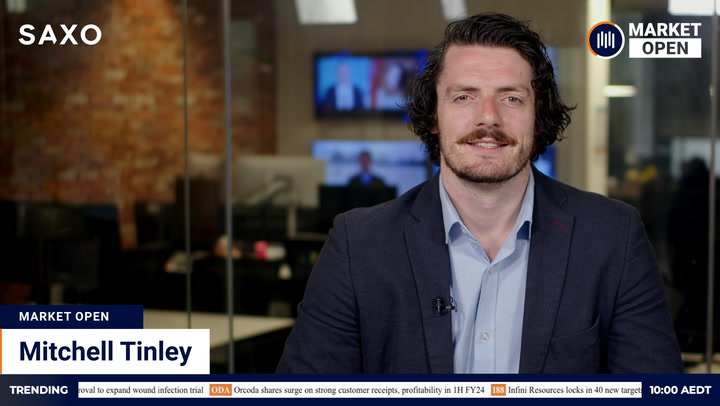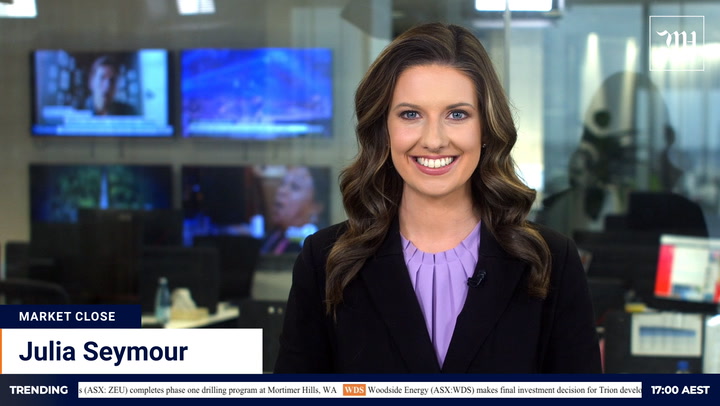Aussie shares suffered their biggest setback since February, sliding more than 1 per cent after inflation fears triggered a sharp sell-off in the US.
The S&P/ASX 200 skidded 76 points or 1.06 per cent. The tech sector fell more than 4 per cent. BHP and Rio Tinto declined from record levels as the high-flying materials sector succumbed to profit-taking.
What moved the market
A day after surging 92 points to a record close, the local market gave most of it back. Today’s loss was the heaviest since a 161-point dump on the last session of February.
The trigger was a classic overnight ‘flight from risk’ as US traders exited tech stocks and other rate-sensitive assets ahead of tomorrow night’s inflation update. The Nasdaq Composite slumped 2.55 per cent. The S&P 500 shed 1.04 per cent.
Inflation fears that jolted markets in February flared up again overnight. Surging commodity prices have been a huge boon for the mining-heavy ASX, but this month’s extraordinary rises in ore, copper, aluminium and lumber are ultimately expected to feed through to retail prices. The market’s biggest fear is that inflation reaches central bank targets faster than expected, bringing an end to the present era of easy monetary conditions.
Growth stocks are particularly vulnerable to higher rates due to the way they are valued on future earnings. Overnight a US index of growth stocks fell 2.05 per cent, versus a 0.19 per cent in an index of value stocks.
A horror session for the buy now pay later leaders saw Zip Co dive 9.14 per cent and Afterpay lose 8.72 per cent. Splitit sagged 4.79 per cent. Fintech IOUpay lost 11.11 per cent.
The big three bulk metal producers retreated as iron ore prices came off yesterday’s highs. Ore prices declined after Chinese exchanges introduced measures to suppress speculative mania that hoicked prices almost $40 in three sessions.
“Iron ore prices in Singapore and China’s Dalian Exchange hit all-time highs yesterday, with iron ore June futures on SGX [Singapore] jumping at one stage 10%, trading to a high of US$226/t. However, the market has already given back a lot of these gains, and this morning is trading back down at around the US$215/t level,” ING commodities strategist Warren Patterson and Wenyu Yao wrote.
“It’s hard to pinpoint a single specific reason for yesterday’s big move, but most market participants believe the surge was a speculative move.”
Fortescue Metals eased 2.82 per cent after Bell Porter cut its rating to ‘Hold’. Rio Tinto retreated 1.75 per cent from yesterday’s record. BHP fell 0.72 per cent.
Winners’ circle
Consumer staples was the only sector to advance during a “risk off” session. Woolworths gained 1.09 per cent, Coles 0.56 per cent and Treasury Wine Estates 0.5 per cent.
Litigation funder Omni Bridgeway was the day’s best performer, rising for a second session after securing $94 million from a class action. The share price rallied 4.28 per cent.
Construction materials manufacturer Boral hit a two-and-a-half-year peak following a takeover offer from the Kerry Stokes-majority-owned Seven Group. The share price rallied 3.38 per cent to $6.72, well above the offer price of $6.50 per share. Boral recommended shareholders reject the offer, which it described as opportunistic and undervaluing the company. Seven shares fell 2.79 per cent.
Doghouse
The biggest losers in the tech space aside from Afterpay were aerial mapping group Nearmap, down 7.67 per cent and WiseTech, down 3.62 per cent. Appen dropped 3.61 per cent, Xero 3.01 per cent and Technology One 2.2 per cent. Altium slumped 1.45 per cent to a 13-month low.
Gold miners retreated despite a fourth straight advance in the yellow metal overnight. Westgold Resources shed 4.63 per cent, Perseus 4.25 per cent, Ramelius 3.5 per cent and Newcrest 0.82 per cent.
Westpac led a retreat in the big four banks, falling 1.29 per cent. CBA gave up 0.6 per cent, NAB 1.03 per cent and ANZ 1.13 per cent.
The speculative and smaller ends of the market have underperformed the top end this week, failing to follow the ASX 20 to fresh heights. The S&P/ASX Emerging Companies index sank 2.3 per cent this session. The Small Ords fell 1.61 per cent.
China-dependent infant formula exporters plumbed new multi-year lows following yesterday’s downgrade from A2 Milk. A2 shares sank 6.39 per cent to their weakest level since 2017. Bubs Australia dropped 4.35 per cent, also a three-and-a-half-year low.
Other markets
Nasdaq futures trimmed sharp initial falls this afternoon, lately down 92 points or 0.7 per cent. S&P 500 futures cut their decline to 17 points or 0.42 per cent.
Most Asian markets suffered heavy losses. The Asia Dow dropped 2.48 per cent as Japan’s Nikkei shed 3.08 per cent and Hong Kong’s Hang Seng lost 1.76 per cent. China’s Shanghai Composite reversed to a gain of 0.48 per cent.
Oil joined a general retreat from risk assets. Brent crude declined 43 cents or 0.63 per cent to US$67.89 a barrel.
Gold inched up 10 cents or 0.01 per cent to US$1,837.70 an ounce.
The dollar faded 0.04 per cent to 78.37 US cents.







